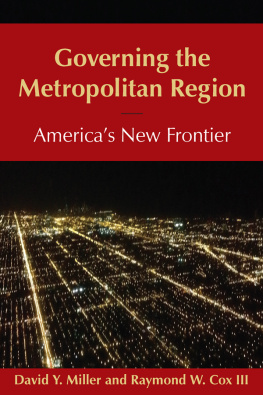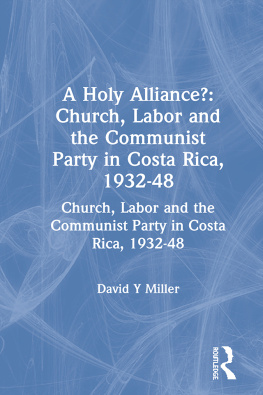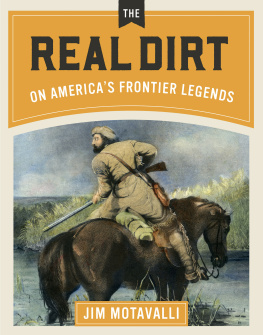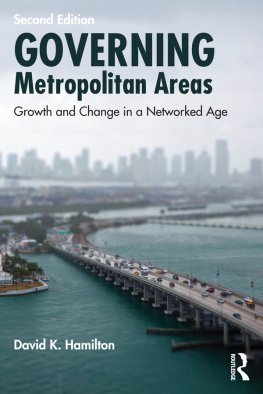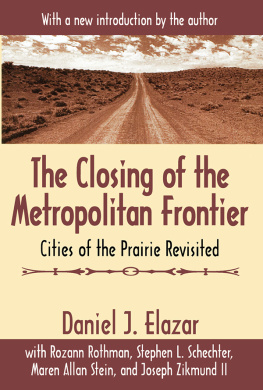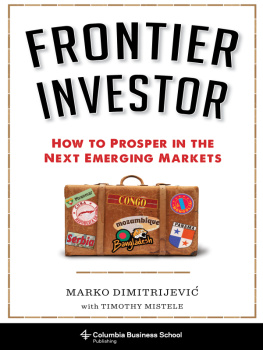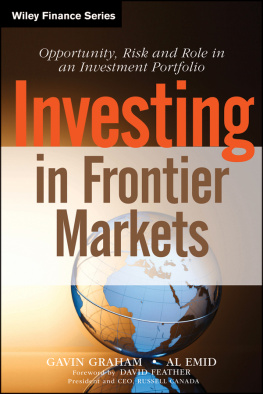Governing the Metropolitan Region
Governing the Metropolitan Region
_____
Americas New Frontier
David Y. Miller and Raymond W. Cox III
First published 2014
Published 2015 by Routledge
2 Park Square, Milton Park, Abingdon, Oxon OX14 4RN
711 Third Avenue, New York, NY 10017, USA
Routledge is an imprint of the Taylor & Francis Group, an informa business
Copyright 2014 Taylor & Francis. All rights reserved.
No part of this book may be reprinted or reproduced or utilised in any form or by any electronic, mechanical, or other means, now known or hereafter invented, including photocopying and recording, or in any information storage or retrieval system, without permission in writing from the publishers.
Notices
No responsibility is assumed by the publisher for any injury and/or damage to persons or property as a matter of products liability, negligence or otherwise, or from any use of operation of any methods, products, instructions or ideas contained in the material herein.
Practitioners and researchers must always rely on their own experience and knowledge in evaluating and using any information, methods, compounds, or experiments described herein. In using such information or methods they should be mindful of their own safety and the safety of others, including parties for whom they have a professional responsibility.
Product or corporate names may be trademarks or registered trademarks, and are used only for identification and explanation without intent to infringe.
Library of Congress Cataloging-in-Publication Data
Miller, David Young.
Governing the metropolitan region : Americas new frontier / by David Y. Miller and
Raymond W. Cox III.
p. cm.
Includes bibliographical references and index.
ISBN 978-0-7656-3983-7 (hardcover : alk. paper)ISBN 978-0-7656-3984-4 (pbk. : alk. paper)
1. Metropolitan governmentUnited States. 2. Municipal governmentUnited States.
3. Urban policyUnited States. I. Cox, Raymond W. II. Title.
JS422.M55 2014
320.850973dc23
2013038334
ISBN 13: 9780765639844 (pbk)
ISBN 13: 9780765639837 (hbk)
Contents
This book is the result of a collaboration that began when the two of us agreed to serve on the then Urban Management Education Committee of Network of Schools of Public Policy, Affairs, and Administration (NASPAA) more than a decade ago. Over time both of us served as Chair of what would be renamed the Local Government Management Education Committee. That close working relationship yielded a number of joint efforts ranging from the review of standards for local government specializations in MPA degrees to panels at NASPAA. After preparing a paper for a symposium sponsored by the Section on Intergovernmental Administration and Management at the American Society for Public Administration conference in 2009, we began a serious discussion about how much had changed concerning urban and metropolitan governance since the publication of The Regional Governing of Metropolitan America (Miller 2002). We agreed that, while the issues had not changed, the broader landscape and political environment had. We decided that a new look was needed. Thus began the collaboration that would yield this work.
We engage this topic from a stance of both respect for the herculean efforts of those who strive to enhance metropolitan governance and a sense of frustration that few really seem to understand metropolitan regions in America and the cities that anchor them. The uneven but necessary recalibration of decision making by isolated local governments separated by large swathes of hinterlands to local governments that are so close together that name plates identifying boundaries are easily missed if one is not looking closely. The former is now a historical artifact although many Americans still try to think and act as if these separations still exist. The latter is a reality we are still learning abouta frontier. Our institutions of local governance were built for the former but really dont work for the latter. Indeed, new ways of doing the business of local governance continue to emerge. We capture these as the governance of the metropolitan region, a new scale for decision making. We build it by not throwing out old local governments, but by reframing them.
The recalibration is also occurring at the state level, the other anchor in the old state-local system. Unfortunately, the term system no longer seems to apply; at best it is a system in considerable disarray. Few states would even acknowledge the need for an urban agenda and still fewer have a sense of urgency about metropolitan regions. Local governments are pushed in two directions, funding from the states has declined yet the rules for spending those funds have expanded. Furthermore, while the state legislatures talk about the importance of regional solutions they are framed as money-saving efforts and are not relevant in and of themselves. This leads to short-term financial fixes that often emphasize the differences and conflicts across local governments.
Our self-appointed task was to explore the dynamics of the new relationships among local governments and between localities and the states in shaping policy in metropolitan regions. That exploration affirmed our concerns, but also suggested new pathways for collaborative governance.
We believe it was to our advantage that we both possess significant practical experience at the local and state levels. Dave started his career (with a newly minted MPA) as the Town Manager of Dover-Foxcroft, Maine (population, about 4,500), at the still wet behind the ears age of 24. Subsequently he managed several other towns in Maine and did a stint as Director of Management and Budget for the City of Pittsburgh. Raymonds practical experience is primarily on the political side of state government, with short stints in the federal government and service on the Akron City Council. His perspective from the other side helped shape and temper our conclusions about the future of Metropolitan America.
We could not have done our work without the help of many others, though we take full responsibility for any errors and omissions. Dave would like to acknowledge George Dougherty of the University of Pittsburgh, who collaborated with him in thinking through the difficult dilemma facing city managers in the balancing of local and regional interestsa topic explored in . Daves thinking on both local and regional government has been shaped by the culture shock experienced after leaving the relative peace and quiet of small, intimate local governments in Maine for the hustle and often overwhelming complexity of modern urban America as practiced in Pittsburgh. During the transition and afterward, Dave Rusks input helped develop the authors sense of how to meld the local with the regional.
Raymonds work in helping to shape state policy with regard to local government allowed him to work in the Massachusetts House of Representatives when an urban agenda was still viable, though focused on policy areas rather than governmental structures. Important lessons came from a year on the Akron City Council just as the Great Recession would exacerbate the growing rift between cities and states (2009).
Both authors owe thanks to their extraordinary students from the University of Pittsburgh and the University of Akron. We are indebted to Katherine Yoon, a doctoral student, and Dillon Moore, a masters student, both at the University of Pittsburgh, who had the unenviable task of trying to keep us on schedule for more than a year. Two doctoral students from the University of Akron also provided vital assistanceTricia Ostertag prepared much of the background material for the discussion on service sharing. The core discussions on service sharing in are the product of her efforts. Beth Gersper took on the role of editor, challenging us to simplify our language to make it more accessible to a wider range of readers. Her work on our behalf was quite remarkable.


